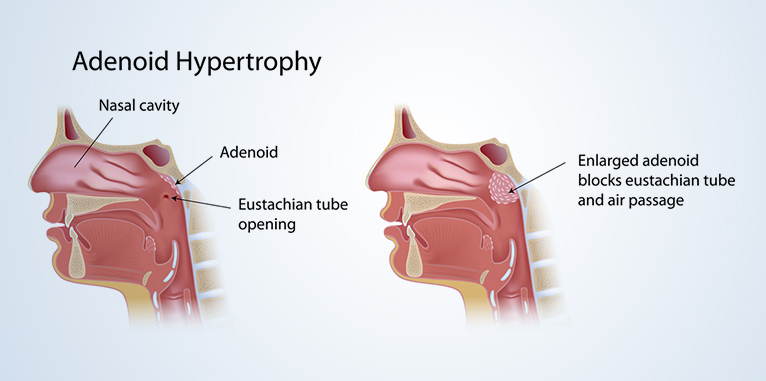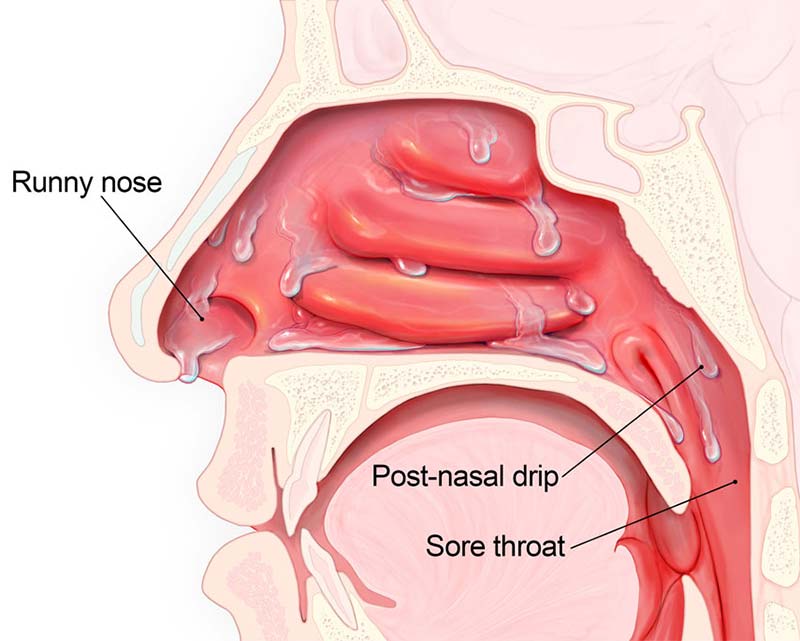My Child’s Blocked Nose and Cough Aren’t Getting Better: Why?

Ear, Nose and Throat (ENT) problems in children are pretty common in Singapore, as well as all over the world! So what common ENT conditions trouble our little ones? At our ENT specialist clinics in Singapore, many kids present to us with blocked nose, persistent coughing and difficulty breathing, both during the daytime and at night when asleep.
Noisy breathing, including snoring, isn’t normal, and usually suggest some sort of airway obstruction either at the nasal or throat levels. Suffering from a constantly stuffy blocked nose, sometimes with slimy mucus running out of their noses, isn’t normal for your poor child either. Some children have so much difficulty trying to eat and breathe at the same time that they just can’t! Then they may either end up not being a good eater or they might make some strange weird mucus noises in their nose and throat, an indication that they just can’t swallow their food and breathe through their blocked nose at the same time. If you tried to swallow your food with a blocked nose, you wouldn’t be able to do so either, because your nasal airways would be blocked, leaving your mouth as the only passageway for air to enter your lungs! This may then lead to recurrent choking or coughing spells in your poor child at mealtimes.
Well, a persistent cough is abnormal too, as most cough symptoms related to a simple uncomplicated upper respiratory tract infection such as the common cold or the flu, usually tend to settle down within a few days. So if your child keeps coughing and coughing, sometimes so badly until they vomit(!), then this is rather worrying and needs to be checked out by your friendly paediatric ENT specialist in Singapore. The repeated bouts of coughing may prevent your poor child from sleeping properly and getting enough rest to recover, in turn disturbing their parents who also become sleep-deprived! We all know now how important sleep is in allowing the immune system to stay strong and healthy, to protect your body against all sorts of bacterial and viral infections, including Covid!
The three symptoms of loud snoring, blocked nose with persistent cough often occur together, but what are the common causes? Is there anything to worry about? When should you bring your child to see your friendly ENT specialist? Let’s see what the common causes of persistent loud snoring, nasal congestion and chronic cough are in children:
- Upper respiratory tract infection (usually viral such as the common cold or the flu)
Viral infections of the nose and throat lead to swelling of the soft tissue inside the nose, especially the “sausages” of the nose, called the turbinates. The adenoids will also tend to grow in size in response to the ongoing inflammation because the adenoids consist of reactive lymph gland tissue so if your child suffers from a bad cold or allergic rhinitis/ nasal allergies, then there is a pretty good chance that those adenoids are going to swell up and block the posterior part of your child’s nose too. Imagine having a very juicy big head of “broccoli” growing at the back of your nose, you can’t see this head of “broccoli” but it’s large enough to obstruct the airway, to cause noisy breathing, loud snoring, sometimes choking and gasping for breath, difficulty breathing and restless disturbed sleep patterns at night!


The adenoids, together with the tonsils, form a protective ring of lymph gland tissue in the nose and throat. They are part of your immune system to fight infections in the young child but did you know that over time, they naturally shrink or atrophy from the ages of 5-10 years? Hence this means that most teenagers and adults have minimal adenoid and tonsil tissue remaining because the importance of the adenoids and tonsils slowly reduces as the young child grows older with other parts of the immune system taking over the immuno-protective function, such as the spleen, bone marrow and many components of our mature blood circulation. However, the natural shrinkage of the adenoids and tonsils does NOT happen in every child, so we still see some adults presenting to us with the same sort of obstructive symptoms due to persistently enlarged tonsils and adenoids that they have had since childhood because their parents had chosen a conservative approach previously.
The commonest question I get asked by many concerned parents whose child is clearly suffering from airway obstruction and disturbed sleep/obstructive sleep apnea issues is: “But won’t my child’s immunity be much worse after the adenoids and tonsils are removed?”
Now let me make it very clear: NOT EVERY child needs to have enlarged tonsils and adenoid tissue removed! We only intervene surgically to consider removal of the adenoids and/or tonsils if there is strong evidence of :
- Recurrent throat infections
- Persistent cough due to the thick infected backdrip coming from the enlarged swollen inflamed adenoids
- Persistent loud snoring
- Recurrent gasping and choking with funny noises in nose and throat
- Disturbed restless sleep patterns and positions
- Nocturnal waking episodes
- Daytime fatigue
- Behavioural issues which might be attributed to poor sleep quality
- Persistent nasal discharge “snotty runny nose”
- Persistent constant mouth-breathing: “My child always has his mouth open, with his jaw looking slack”. The “adenoid face” is something that happens very gradually over time and many parents may not notice this happening, as it takes a few years for the facial bones to grow fixed in this slack-jawed, open-mouth position.
2. Nasal Allergies (Allergic Rhinitis)
So why do nasal allergies occur? This condition is all to do with a hyper-sensitive nose, what we call “atopy”, a state of sensitivity of the upper and lower airways and skin. Atopic individuals go on to develop eczema or dermatitis, allergic rhinitis and allergic asthma, conditions which are found commonly in the developed world. It tends to run in families too and other influences come from the environment around us. In Singapore, the warm and humid weather is a common trigger for nasal irritation, while the three species of house dust mite found here, are the top cause for allergic rhinitis (“morning sinus”), allergic asthma and eczema conditions.
The allergy or atopic state acts as a constant stimulant of reactive lymph gland hyperplasia (growth), leading to persistent swelling of the turbinates and the growth of the adenoids and tonsils. Hence it is important to control underlying allergy factors, including treating any allergy triggers such as House Dust Mite allergy with a course of desensitisation treatment (sublingual immunotherapy).
Nasal allergies often cause a persistent postnasal drip, “runny nose from the back”, which then leads to the dripping and buildup of mucus secretions in the throat and eventually landing on your child’s voicebox lower down to irritate it repeatedly. Then it’s no surprise that your child keeps coughing again and again because of this mucus backdrip landing on his vocal cords which react to shut together in the form of the cough reflex, to stop this mucky mucus from flowing down into your child’s windpipe to infect the lower airways of the lungs!

3. Enlarged tonsils and adenoids
Ultimately, if all the above symptoms keep persisting, then your poor child isn’t going to be able to sleep well because he can’t breathe well. Then you know it’s time to see your friendly ENT specialist in Singapore to get your child’s nose and throat thoroughly checked out for the above issues. Blocked nose, snoring and persistent cough are probably the most common ENT conditions I see in children in Singapore, in addition to ear infections and hearing loss in children!
Other conditions such as acid reflux or gastritis, may also cause a chronic cough and throat irritation, so sometimes, a paediatric gastro specialist may work hand in hand with your ENT surgeon to look after your child.
Share this blog via:


